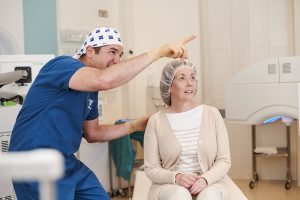Does Cataract Surgery Help Glaucoma?

Our eyes have a lot to contend with throughout our lives. Being complex and vital organs that are more exposed than their counterparts in the rest of the body, the eyes often do a surprisingly good job at remaining healthy and in good working order. But as we get older, it is increasingly likely that they will become affected by various problems, including presbyopia, cataracts, and glaucoma.
Both cataracts and glaucoma are more likely to develop as we age. In fact, cataracts are simply a natural part of the eyes’ ageing process and, eventually, we will all develop them.
Age is also a risk factor for glaucoma, which can mean that many patients who have glaucoma also have cataracts. This may make you wonder, then, can Cataract Surgery help glaucoma?
What is Glaucoma?
Glaucoma is a common eye condition that affects the optic nerve – the nerve that connects the eye to the brain. Over time, the optic nerve becomes damaged, resulting in vision loss. The most common form, open-angle glaucoma initially affects the peripheral vision. While this may not be noticeable at first, this can progress to “tunnel vision” and, if left untreated, the eventual loss of central vision.
Glaucoma is usually caused by fluid building up in the front part of the eye, causing increases in intraocular pressure. Loss of vision in glaucoma patients is irreversible, making early detection and effective treatment vital. Medications and surgery can help to slow down the progression and/or prevent further vision loss; however, there is no cure for glaucoma.
What are Cataracts?
Unlike glaucoma, cataracts are a normal part of the ageing process. Like glaucoma, however, if cataracts are left untreated, they can also lead to significant vision loss and even blindness. In fact, cataracts are the leading cause of blindness, worldwide.
As we get older, the proteins in the lenses of our eyes begin to break down. These broken-down proteins start to clump together in the lens, eventually forming a cloudy obstruction in the eye. This is called a cataract.
A cataract can take years to become noticeable; however, over time, it can begin to obstruct vision as light is prevented from hitting the retina effectively. Eventually, treatment is required to remove cataracts and restore the patient’s vision. Cataract Surgery is the only effective treatment for cataracts.
Cataract Surgery and Glaucoma
Sooner or later, most people will require Cataract Surgery on one or both eyes – including patients with glaucoma. While the presence of glaucoma can complicate a patient’s suitability for some eye treatments, including Laser Eye Surgery, there is some evidence that Cataract Surgery may actually be beneficial.
Cataract Surgery has been found to effectively lower intraocular pressure (IOP) in many patients. These IOP-lowering effects have been demonstrated to last for 10 years and be similar in patients of all ages. Furthermore, Cataract Surgery has also been associated with a reduced need for anti-glaucoma medications in glaucoma patients.
While the exact cause for IOP reduction following Cataract Surgery is unknown, one hypothesis suggests that the procedure may lead to increased aqueous outflow in the eye.
Are there any risks?
However, it is important to note that not all patients experience reduced intraocular pressure after Cataract Surgery. Some patients have even been known to experience post-operative spikes in IOP.
It is, therefore, vital for high-risk patients to be carefully monitored before and after Cataract Surgery. Still, reviews continue to conclude that Cataract Surgery may play a role in IOP reduction in open angle glaucoma and angle closure glaucoma. Though the procedure does not always offer adequate IOP control.
The risks and benefits of performing Cataract Surgery in patients with glaucoma should be determined on a case-by-case basis. At London Vision Clinic, we perform an extensive screening process to ensure that each patient received appropriate and effective treatment.
If you have glaucoma and are in need of Cataract Surgery, get in touch with one of our clinic coordinators to discuss your options. Alternatively, Book a no-obligation Consultation today.


